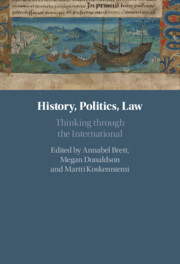Book contents
- History, Politics, Law
- History, Politics, Law
- Copyright page
- Contents
- Acknowledgments
- Notes on Contributors
- Introduction History, Politics, Law
- Part I Methods, Approaches and Encounters
- Part II Thinking through the International
- Law and Constructions of the Political
- Empires, States and Nations
- Institutions and Persons
- Economics and Innovation
- 11 Sea Change
- 12 The Political Economy of Context: Theories of Economic Development and the Study of Conceptual Change
- Gender
- Index
11 - Sea Change
from Economics and Innovation
Published online by Cambridge University Press: 28 September 2021
- History, Politics, Law
- History, Politics, Law
- Copyright page
- Contents
- Acknowledgments
- Notes on Contributors
- Introduction History, Politics, Law
- Part I Methods, Approaches and Encounters
- Part II Thinking through the International
- Law and Constructions of the Political
- Empires, States and Nations
- Institutions and Persons
- Economics and Innovation
- 11 Sea Change
- 12 The Political Economy of Context: Theories of Economic Development and the Study of Conceptual Change
- Gender
- Index
Summary
In his famous 1968 essay, ‘The Tragedy of the Commons’, Garrett Hardin chose the sea as an illustrative example. ‘[T]he oceans of the world continue to suffer from the survival of the philosophy of the commons’, he wrote.1 ‘Maritime nations still respond automatically to the shibboleth of the “freedom of the seas”. Professing to believe in the “inexhaustible resources of the oceans,” they bring species after species of fish and whales closer to extinction.’2 Using this and other examples Hardin argued for enclosure or – as he later phrased it – management of the commons, under private property or taxation regimes.3 In the absence of enclosure, ‘total ruin’ was inevitable.4
- Type
- Chapter
- Information
- History, Politics, LawThinking through the International, pp. 285 - 308Publisher: Cambridge University PressPrint publication year: 2021

